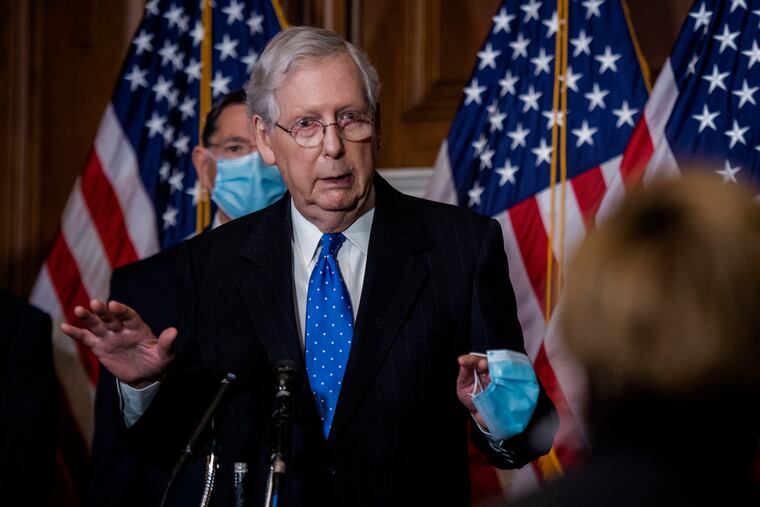White House pushes Senate GOP to include $600 stimulus payment in relief package
Senate Majority Leader Mitch McConnell, R-Ky., did not include a second round of stimulus payments in the relief proposal he released last week.

WASHINGTON - White House officials are asking Senate Republican leadership to include stimulus checks worth $600 in the emergency economic relief package currently being debated in Congress, according to two people granted anonymity to share details of private deliberations.
Senate Majority Leader Mitch McConnell, R-Ky., did not include a second round of stimulus payments in the relief proposal he released last week. Senior Republican leadership in Congress are listening to White House officials push for the inclusion of the stimulus checks, the two people said, a provision also broadly supported by congressional Democrats.
President Donald Trump has privately indicated a willingness to send another round of stimulus checks of as much as $2,000, according to one person in direct communication with the president. Congress in March approved a round of $1,200 stimulus checks that the Treasury Department disbursed to more than 100 million American families in a matter of weeks.
A second round of stimulus checks was left out of the $908 billion bipartisan framework unveiled last week by a group of moderate Senators hoping to break the months-long impasse over stimulus negotiations. Sens. Josh Hawley, R-Mo., and Bernie Sanders, I-Vt., have been pushing for the checks to be included in the final package, with Sanders going as far as saying he will vote against the relief legislation unless they are approved. Trump's name was printed on the first round of stimulus checks sent over the spring and summer.
Lawmakers are working furiously this week to reach agreement on a range of divisive policy questions, including how to apportion aid to state and local governments and a liability shield to grant legal immunity to firms over coronavirus-related lawsuits. A number of critical emergency aid programs are set to expire if Congress fails to act, including unemployment benefits for more than 12 million people and a federal eviction moratorium. Congress is expected to approve a one-week "continuing resolution" this week to avert a shutdown of the federal government after Dec. 11.
The urgency of negotiations has led to a flurry of activity on Capitol Hill. Sen. Susan Collins, R-Maine,, one of the leaders of the $908 billion bipartisan framework, acknowledged support for a second round of stimulus payments but said the groups effort was more narrowly aimed at those in need.
"I know there's considerable public support for it, but right now we're targeting struggling families, failing businesses, health care workers and we don't have a stimulus check to every single person, regardless of need," Collins told reporters.
Hawley expressed frustration on Tuesday about negotiators being "pretty dug in on the idea of not including checks." Hawley added: "I see them saying things like 'this is an emergency relief bill.' I don't know what's more of an emergency than working people and families who are having to get into food lines ... I don't understand that logic at all."
The stimulus checks have divided economists as well as lawmakers. Some economists point out that millions of stimulus checks were received by families who are prospering economically and have not lost their jobs or suffered pay cuts, arguing they were poorly targeted for the current crisis. Other economists have said the stimulus checks helped stabilize a turbulent economy and reached many people struggling economically who were denied unemployment benefits or other forms of social insurance. An August analysis by the Urban Institute, a centrist think-tank, found the stimulus checks would keep 6.3 million people out of poverty.
House Democrats have included more generous versions of the $1,200 stimulus checks in their stimulus proposals.
A spokesman for McConnell declined to comment on the White House push for more stimulus checks. A White House spokesman and a Treasury Department spokeswoman also did not immediately return requests for comment.